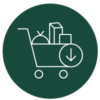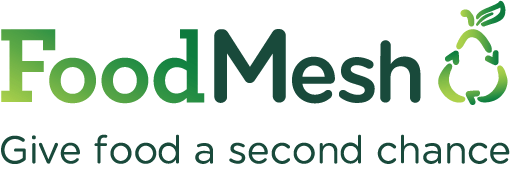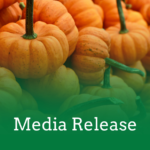17 Jan How Metro Vancouver keeps food out of the landfill
The problem
Take a moment to absorb this: more than half of the food produced in Canada is not eaten. Of this food, 32% could be rescued to feed the 1 in 8 people in our communities who lack reliable access to affordable and nutritious food (but most often isn’t).
The majority of this potentially edible food is lost or wasted before you or I even see the food – during its production (6%), during processing and manufacturing (43%), distribution (5%) and then when the food is in the retail (12%) and food service (13%) stage of the supply chain. Consumers are responsible for a further 21% of the food being wasted. 1

As well as the travesty of food going to waste when there are people in our communities who are in desperate need of a meal, the lost and wasted food that ends up in waste streams is having a catastrophic impact on our environment.
When compostable material ends up in landfill with no access to oxygen, it produces methane—a greenhouse gas that is at least 28 times more potent than carbon dioxide.2 In Canada alone, food waste creates 56.6 million tonnes of carbon dioxide-equivalent emissions every year.3 It contributes to 8% of global greenhouse gas emissions, and if food waste were measured as a country, it would be the world’s third-worst emitter (after China and the USA).4
In Canada alone, food waste creates 56.6 million tonnes of carbon dioxide-equivalent emissions every year.
– The Avoidable Crisis of Food Waste: Technical Report by Second Harvest
Taking action
This is a problem that requires action. And Metro Vancouver is tackling it head on.
In January 2015, Metro Vancouver was among the first regions in Canada to implement a disposal ban on organic materials, encouraging all residents and businesses to separate their food scraps from their garbage. In doing so, the organics could be sent to a specialized facility where it could be turned into compost, or to another facility for the methane it produces to be repurposed and turned into energy or biofuel.
This ban, along with municipalities’ own organics programs and private sector hauling partnerships, has led to a 60% increase in organic recycling in Metro Vancouver between 2013 and 2017. Today, Metro Vancouver’s organic diversion rate stands at 68% — close to 450,000 tonnes a year.
If food waste were measured as a country, it would be the world’s third-worst emitter (after China and the USA)
– The Food and Agriculture Organization (FAO) of the United Nations
Focusing on diversion
In 2017, Metro Vancouver extended its reporting to include organics that were being reused in the region (i.e. used in its original form with very little processing). In its 2020 Recycling and Solid Waste Management report, Metro Vancouver found that some 4,800 tonnes of food in the region had been recovered and reused.
In October 2021, the region provided an additional tool to organizations to divert food away from waste streams when it started working with FoodMesh, to grow its regional food recovery network.
Expanding upon existing food recovery hubs that FoodMesh helped to build in the City of Richmond, as well as in the neighbouring Fraser Valley Regional District, the Metro Vancouver Regional Food Recovery Network comprises organizations from across the food supply chain. Food organizations in the network leverage FoodMesh’s programs to safely, quickly, and efficiently divert the food they can no longer sell through their usual channels to other organizations that could put that food to good use, to prevent them from having to dispose of it.
FoodMesh CEO and Co-Founder, Jessica Regan, explains: “This project is about building a connected food system where we can quickly match that unsold food to a network of verified organizations that can put that food to good use according to best and highest end-use.”
The diversion follows a strict hierarchy: food that is edible is diverted to organizations that can turn it into meals, such as hunger-relief agencies. The food no longer suitable for human consumption is shared with farmers for animal feed where possible. Only when it can’t be eaten is it composted.
This project is about building a connected food system where we can quickly match that unsold food to a network of verified organizations that can put that food to good use according to best and highest end-use.
– Jessica Regan, CEO and Co-Founder of FoodMesh
One of the first matches FoodMesh made after the Metro Vancouver Regional Food Recovery Network was formed was on behalf of an airline company from YVR. It helped redirect the equivalent of 4,000 meals that would have otherwise been sent to landfill to a number of charities across Metro Vancouver – a perfect example of what is possible when a connected food system is in place.
FoodMesh can help organizations with surplus food divert it to higher-end uses through the following programs:
Marketplace

Any food organizations with large volumes of surplus on an ad hoc basis can use FoodMesh’s online Marketplace to connect with a network of verified organizations to take that food. They can choose to either try to sell it and recover some of their costs, or donate it to a hunger-relief agency.
Retail Food Recovery Program

Retailers can get their unsalable food collected by hunger-relief organizations on a daily basis through FoodMesh’s Retail Food Recovery Program. All food is weighed and tracked as it leaves the store, so retailers can get real-time data on the volume of their donations, the departments they are coming from and the impact they are having.
What’s next
The financial support provided by Metro Vancouver to FoodMesh is expected to see up to 5 million meals worth of food being rescued over the course of the three-year project, saving 5,700,000 KG of CO2 emissions from entering the atmosphere.
While there is much work to be done across Canada and the world to significantly reduce the volume of food being lost and wasted along the supply chain and the resulting greenhouse gas emissions, Metro Vancouver’s leadership in this space is an important first step, and one we hope other regions and municipalities will follow.
Join the network
Any organization interested in participating in food recovery either as a food supplier or recipient is invited to join the FoodMesh network. If our programs don’t meet the unique food recovery needs of your organization, then we will refer you to an organization in the region that can help you.
Use #MetroVanLovesFood to follow the Metro Vancouver Regional Food Recovery Network on social media and learn about the ways you can participate.
Written by Megan Czerpak, Head of Communications at FoodMesh
Footnotes
- According to The Avoidable Crisis of Food Waste: Technical Report by Second Harvest
- According to the United Nations Economic Commission for Europe
- According to The Avoidable Crisis of Food Waste: Technical Report by Second Harvest
- According to the Food and Agriculture Organization (FAO) of the United Nations



